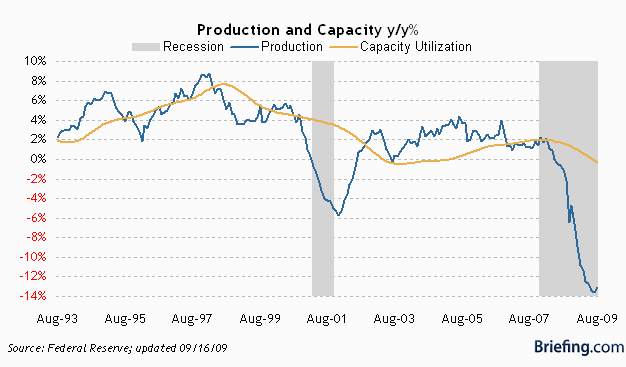 Every time I try to get bullish, they pull me back in!
Every time I try to get bullish, they pull me back in!
We have struggled for two weeks trying to get more bullish but even at yesterday's exciting close we remained 55% bearish and decided to hold that stance into the weekend. As I updated our $100K Virtual Portfolio last night, I was surprised and disappointed that I could find no justification to raise my targets on AMZN, BAC, C, GE, UYG or XLF, sticking with our generally bearish positions, even though they burned us this week. While both GE and BAC beat on earnings this morning, both companies missed on revenues and what's surprising is how sharply the markets reacted to such small misses.
We've been saying for quite some time that revenue projections are in fantasy land. Overall wages may be up 0.2% for the year but the average workweek is down 7% and 10% of our population isn't taking home a paycheck at all – of course revenues are going to be down, how is that even surprising? For the week, revenues of reporting companies are down about 18% so I consider a winner anyone who's ahead of the curve (not counting financials, who were given special gifts this year). Even with that gift, it was the financial unit that dragged GE down, with GE Capital's profits down 87% for the quarter, dragging corporate earnings down to just 23 cents a share, but better than the .20 expected by analysts (see my weekend rant against low expectations).
We also have low expectations for today's Industrial Production and Capacity Utilization Report. Pretty much anything better than terrible is likely to be celebrated after looking at this chart:

The bounce we got in last month's report was due to an increase in the production of foods and beverages (up 1.6%) as well as chemicals (up 0.7%) and utility production (up 1.9%) and, of course, the Auto Sector, where Cash for Clunkers ramped up motor vehicle assemblies 12.1% overall. Outside of motor vehicles, production was up just 0.4%, which is what is expected for this month. As expected by the unemployment numbers, Cap Utilization is hovering around 69%, 11% lower than "normal," a strong indication that you do still need people to run those machines despite decades of robotics advancement. 
Hey, there's an idea – let's create an army of robot shoppers and equip them with American Express Black Cards and program them to go out and BUYBUYBUY. They've been programming the American people to be shopping bots since WWII so perhaps it is time to take things to the next level as the US Consumer seems to be faltering in their duties. Just last night, Tim Geithner warned that the U.S. will need a long adjustment to new savings patterns, and other countries will have to be "less reliant on the U.S. lifting the rest of the world out of recession. America should avoid a long-term slump but the dominant risk is on the growth front."
The growth front? Isn't that the front that we need to justify these incredibly high p/e levels? "I am worried about unemployment and I see an enormous amount of slack. I hear it everywhere," Federal Reserve Bank of Dallas President Richard Fisher told Reuters in an interview. "I am super-hawkish on inflation. I don't think that is where the risks are right now. The risk is a disinflationary/deflationary risk… I don't see a 'V'-shaped recovery. I see a couple of quarters of growth and then the question is where do we go from there. That is the real key question in 2010 and 2011. But then the question is, what happens next? And I don't see the economy growing at a rate that gobbles up slack so quickly that it creates inflationary pressures."
See, he's just saying what I've been saying only it sounds much more official when Fisher says it. Our pal Dylan Ratigan is helping to make my other pet peeve official with an article he subtly titles: "Goldman Sachs is Robbing Us Blind" in which he says the only apparent skill of our favorite IBank is "rigging the game." Rather than be great investors, Dylan charges, GS follows the "second, and seemingly preferred method, exploit those who know less than you — and take their money, even if you have to change the laws to do so."
To make money, the banks exploit two loopholes. The first — overcharge customers by depriving them of the type of competitive pricing only possible on an exchange like the New York Stock Exchange or Chicago Mercantile Exchange. And the second, exploit the lack of transparency to hide the fact that you are keeping little or no money to pay claims while selling insurance and collecting fees on every house and pension payment in America. The key to success here is that when there is a default or claim against that so-called credit insurance — the banks keep all the past payment — and the taxpayer under threat of collapse pays off the claims while getting nothing in return. This quite simply, is a brilliant way to steal our money.
Barry Ritholtz is also looking at Goldman today with the backhanded compliment that they are "A Bunch of Clever Thugs." Now that hating GS is so popular, I'm losing interest in it other than to point out that, just because your local mobster is doing well, it doesn't necessarily follow that the other lenders are going to be reporting stellar earnings. Take BAC for example, we kind of figured they would not be giving us good news today when Ken Lewis announced he wasn't taking pay or a bonus in 2009, despite bringing the stock back from $2.52 in March to $18.10 yesterday. Perhaps it's because BAC lost $1Bn on consumer defaults this quarter and losses on failed loans came to $10Bn for July, August and September. Bank of America said it lost $2.24 billion, or 26 cents per share, after accounting for the preferred dividends of $1.24 billion. That compared with earnings of $704 million, or 15 cents per share, a year earlier. Keep in mind, this is what we consider a "beat" in today's market!
Asia took a pause this morning and pretty much flatlined into the weekend. "Speculative investors are cashing out to prepare for the launch of the secondary board in coming weeks," said Qian Qimin, an analyst at Shenyin Wanguo. The recent rapid rise in the Korean won also caused some concern for exporters. Posco rose 1.1%, with SK Energy gaining 1.3%. But Samsung Electronics slumped 3.7% and Hyundai Motor sank 4.9%. LG Display fell 4.2% after the flat-panel maker signaled a weaker profit in the current quarter.
![[HANDM]](http://s.wsj.net/public/resources/images/MK-AY935_HANDM_NS_20091015204817.gif) EU markets are off about .75%, but it's quite a come-down from this morning's up 0.5% open. Generally, the BAC results are being blamed but IBM and GE are going to ding the Dow for a good 40 points this morning. Sony Ericsson's business is down, which isn't surprising as one in three smart-phones sold on the planet Earth is now an IPhone. In more evidence of the critical need for shopping-bots, H&M stores (1,869 Macy's-like stores in Europe) had an 8% drop in same-store sales in September. Sales have now declined in 13 of the last 14 months and, according to the WSJ, "H&M is generally seen as outperforming many of its peers during the downturn."
EU markets are off about .75%, but it's quite a come-down from this morning's up 0.5% open. Generally, the BAC results are being blamed but IBM and GE are going to ding the Dow for a good 40 points this morning. Sony Ericsson's business is down, which isn't surprising as one in three smart-phones sold on the planet Earth is now an IPhone. In more evidence of the critical need for shopping-bots, H&M stores (1,869 Macy's-like stores in Europe) had an 8% drop in same-store sales in September. Sales have now declined in 13 of the last 14 months and, according to the WSJ, "H&M is generally seen as outperforming many of its peers during the downturn."
Fortunately, there is some "good" news this morning that is boosting oil and gold: Net foreign purchases of long-term securities were $28.6B, up from $15.3B in July but well short of June's $90.7B. Consensus was for $30B. The ongoing capital outflow may signal further downside for the dollar. Yes, there is nothing like a dying dollar to help boost those markets…
In news that is actually good, September Industrial Production was +0.7% vs. +0.8% in August and way better than the consensus estimate of +0.2%. Capacity utilization surged to 70.5% vs. 69.6% last month and 69.8% expected and those are very nice moves for the month, much better than I expected. So, like yesterday, it looks like we'll be taking this little dip as an opportunity to take some quick profits on our shorts and initiate a few long positions. At the moment our strategy is to take long positions that have very high percentage returns which allows us to commit little capital to a run we don't yet believe in but giving us a good upside if the market does indeed keep going.
Fortunately, we were bullish on GOOG yesterday, with a neutral butterfly covered with a longer bull call spread. GOOG knocked it out of the park last night with third-quarter revenue rising 7% over last year's same period, to $5.94 billion, as Internet advertising business brightened. Net income jumped 27% to $1.6 billion from a year ago. Our big payoff comes if GOOG can get to $580 by March as our $11 $550/580 spread would pay back $30 (up 172%) so we anxiously await the upgrades but, for today, we'd prefer if they stay below $550 as that's the sweet-spot on our butterfly spread.
Have a great weekend,
– Phil


